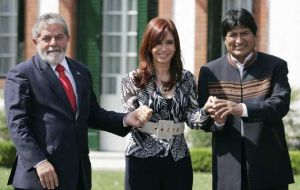MercoPress. South Atlantic News Agency
Regional summit anticipates energy shortage next winter
 Ptes. Lula da Silva, Cristina Fernandez and Evo Morales during the summit
Ptes. Lula da Silva, Cristina Fernandez and Evo Morales during the summit In spite of the smiles and pictures the Buenos Aires presidential summit of leaders from Argentina, Brazil and Bolivia could not agree on a way out to the energy and distribution situation that threatens the three countries this coming winter and apparently could only be solved in the mid term.
Speaking on Saturday Bolivian Energy Minister Carlos Villegas said presidents Cristina Fernandez de Kirchner, Luiz Inacio Lula da Silva and Evo Morales amicably discussed ways to divide up limited Bolivian supplies, but reached no immediate solution. "We need to assure the overall supply of energy for the long term" Villegas said. The three leaders agreed to create a committee made up of the three energy ministers "that is going to study the structural issue of gas supplies at times of peak demand" and will be meeting sometime in "the next few weeks" in La Paz. The coordination group is made up of Argentina's Federal Planning minister Julio De Vido; Brazil's Mines and Energy minister Edson Lobao and Carlos Villegas. "The group will address the structural issue and provision for the current demand peaks", said Villegas. The presidents made no public statements after leaving the talks. Only Brazilian president met with the press at the airport before his return to Brazil and later to compensate Argentine Foreign Affairs minister Jorge Taiana read an official release and was available for questions from the few journalists that remained. Bolivian president Morales was quoted in the Argentine press saying that pending an expansion of Bolivian capacity a temporary solution would be to redistribute its supplies between Argentina and Brazil, which Lula da Silva did not accept. However he also told his counter parts that Bolivia's priority is and will continue to be the supply of the growing Bolivian domestic market. Taiana in the short release from the Argentine government said that the coordination group would analyze "the evolution of energy demand and coordinate the necessary steps". He added that "this means the best alternatives for production and infrastructure growth in the energy sector so that they can keep pace with the expansion of the economies". In a more upbeat spirit President Lula said that after a long time without investments, Petrobras and Bolivia are investing in Bolivia's gas industry which means that in the mid term Bolivia will be able to face the demand from Argentina and Brazil and our problems will be over". "Energy is not only gas. What matters is having a sufficient supply of MW for the countries that need them; Argentina, Brazil and Uruguay. An energy solidarity policy is extremely important", emphasized Lula da Silva. Argentina currently imports 3 million cubic meters of Bolivian gas per day and should begin receiving 7.7 million cubic meters according to the contract signed by Morales and former president Nestor Kirchner. Brazil also receives between 27 and 30 million cubic meters per day for the Sao Paulo industrial hub, guaranteed under current contract conditions. And the head of the Brazilian government owned Petrobras oil and gas corporation José Gabrielli was quoted saying previous to the summit: "It is impossible to cede to Argentina even a molecule of gas". According to Brazilian officials during the meeting Mrs. Kirchner asked Brazil to let Argentina have one of the 30 million cubic meters to ensure domestic supply next winter. But Lula da Silva said "NO", and offered instead 200 MW of energy per hour, which amounts to approximately the million cubic meters requested by Argentina. However the situation does not look more encouraging for 2009. Bolivian officials say they expect demand from both countries to jump by as much as seven million cubic meters daily in 2009. Bolivia's natural gas industry, suffering from tepid foreign investment following President Morales' 2006 hydrocarbons nationalization, will be hard-pressed to match the increase and that has raised fears of shortages. Argentina last year signed a deal with Bolivia to dramatically expand the amount of gas it will import and the two countries are moving forward on a 1.9-billion-dollar pipeline to quadruple the daily capacity of gas exports to 27 million cubic meters daily when completed in 2011. The threat of energy shortages is a headache especially for Argentina, where bitter cold last winter led to natural gas shortages. The country also weathered summer blackouts caused by heavy air conditioner use. In Brazil the Lula da Silva administration facing municipal elections later this year, has also fresh in mind that the 2002 energy shortage and rationing opened the way for his Workers Party victory late that year.




Top Comments
Disclaimer & comment rulesCommenting for this story is now closed.
If you have a Facebook account, become a fan and comment on our Facebook Page!